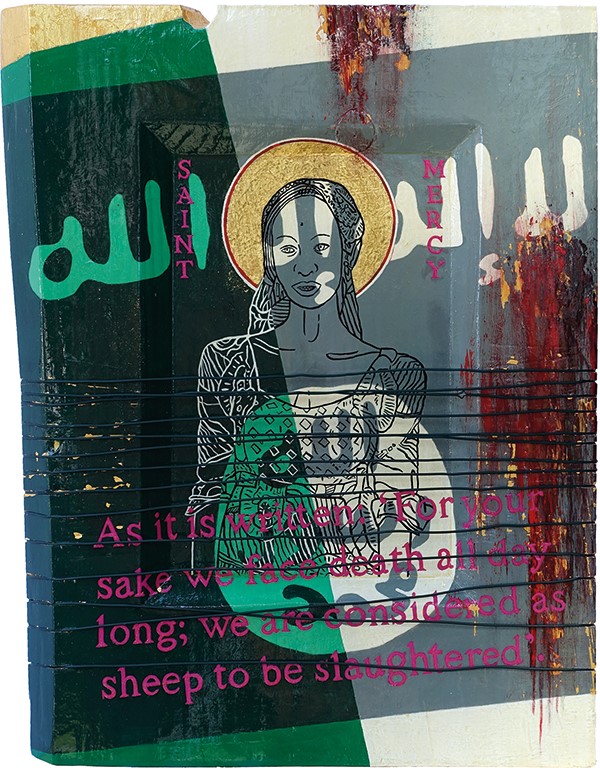Hobbs, Paul - VM - Nigel Halliday
Paul Hobbs: Saint Mercy - Nigeria

A Golden Substrate
by Nigel Halliday
In fact, the time is coming when anyone who kills you will think they are offering a service to God. John 16:2
This image of Saint Mercy - Nigeria is one of a series by Paul Hobbs commemorating ‘ordinary’ Christians who are victims of persecution around the world. Hobbs has taken the form of the icon, traditionally used to honour saints who then point us to Christ. But, as Philippians 1:1 reminds us, ‘ordinary’ Christians are saints too: every Christian is holy to God and deeply loved by him. ‘Precious in the sight of the Lord is the death of his saints’ (Psalm 116:15).
The saint shown here is Mercy James, a Nigerian Christian, who was kidnapped by Boko Haram, forcibly married, and compelled to attend Islamic rituals. In all this she refused to deny her faith in Jesus. Miraculously Mercy, although deeply traumatised, was rescued alive by the military. Many who refused to convert did not survive.
It is estimated that between 50 % and 70 % of all religious persecution across the globe is directed at Christians. The organization Open Doors says that worldwide in 2021 at least 5898 people were martyred for their faith in Jesus.
State-sponsored persecution is worst in countries as Afghanistan, North Korea, and Somalia. But as far as life and limb are concerned Nigeria, officially a non-religious state, is the most dangerous. Almost 80% of those 5898 martyrs were in Nigeria. In the first three months of this year 896 Nigerians were murdered by extremist Islamic militants, the majority of the victims being Christians. In other words, at the moment in Nigeria about 10 Christians are murdered for their faith every day.
Hobbs’ icon is a not a narrative image of a martyr’s experiences, but a conceptual combination of text and images to point us to awful current spiritual realities faced by so many. Across the bottom of the image are the words of Romans 8:36: ‘As it is written: “For your sake we face death all day long; we are considered as sheep to be slaughtered.”’
Like all the works in this series it is a deeply sombre image, all the more so for its quiet understatement. The victim is shown in a simple line-drawing, partly reversed out against the black background. She is wearing a Nigerian costume, symbolizing the beauty and youthful prospects that were taken from her. The background is layered in abstract shapes derived from two flags. The black one represents Boko Haram. The green and white is from Nigeria’s flag. In his accompanying notes, Hobbs notes the irony: green is intended to represent natural wealth; white, peace.
Traditional Western images allow the viewer a kind of safety, as you stand outside the frame and observe from a safe distance, as if from a point of neutrality. But the icon format is more visceral. It addresses the viewer directly and points you personally to the realities for which they are symbols. In Hobbs’ image the viscera are almost visible: the panel has been physically distressed by the artist to symbolize Mercy’s suffering and wrapped in wire to point to her abduction and captivity.
Yet, awful though the present reality of persecution is, the icon does not allow us to give way to despair. Few of the elements in it are attractive in themselves. But there is a beauty to the artistic arrangement, the intuitive balance of forms and tones, the instinct to impose order and look for meaning and purpose, which points us towards hope, redemption and restoration.
What is not obvious to the viewer is that in this image, as in all the works in the series, the preparation of the painting surface involves it being almost entirely covered with gold leaf, which is then obscured by the painting. In the icon tradition gold points us to God, and it reminds us here that in this world of suffering and injustice God is always with us and will one day be revealed in all his glory.
Our present sufferings of whatever kind are, says Paul, ‘light and momentary’ (2 Corinthians 4:17) compared to the eternal glory that is promised to us if we hold fast to him, when Christ will say, ‘Well done, good and faithful servant … enter into the joy of your Lord’ (Matthew 25:21).
*****
Paul Hobbs’ series of images have been published as Unknown martyrs: ‘icons’ of the contemporary persecution of Christians worldwide, available from arthobbs.com, £10.00. The paintings are also available to form an exhibition. For more information contact https://www.arthobbs.com/.
See also Paul Hobbs’ article on the project on ArtWay.
Paul Hobbs (b. 1964) is a British painter and sculptor born in Nigeria currently living and working in Gloucester, UK. His work explores contemporary social issues in the light of biblical values. www.arthobbs.com
Nigel Halliday, MA (Cantab), MA (London), Ph.D (London), is a British art historian. https://www.nigelhalliday.org
ArtWay Visual Meditation 2 October 2022


